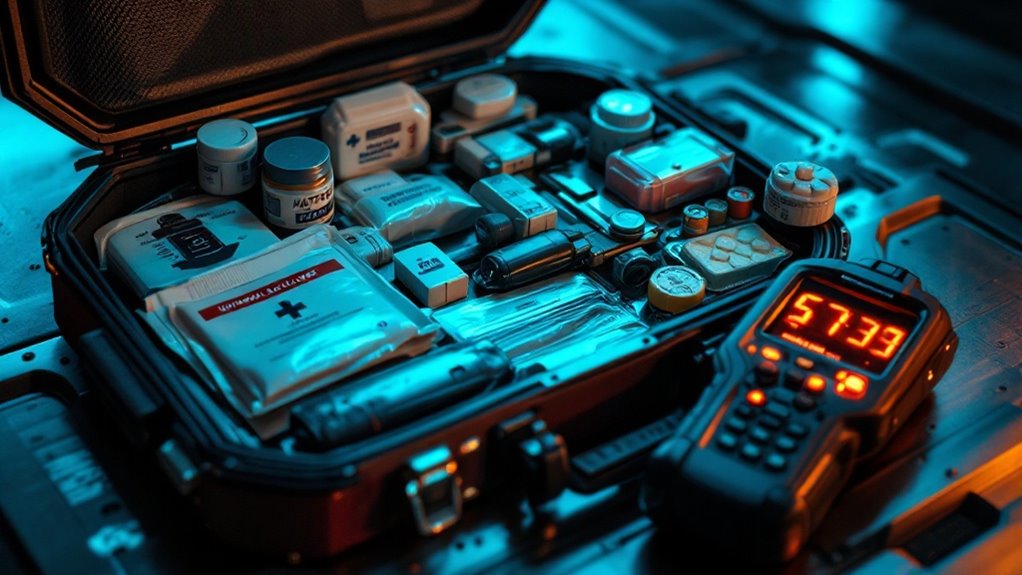Physical Address
304 North Cardinal St.
Dorchester Center, MA 02124
Physical Address
304 North Cardinal St.
Dorchester Center, MA 02124

Star Trek’s space exploration principles offer valuable lessons for Earth-bound travelers. You’ll benefit from packing light with multipurpose gear, researching local customs before arrival, and keeping reliable translation tools handy. Stay prepared for unexpected situations, make cross-cultural connections, and maintain backup navigation methods. While exploring, document your journey thoroughly, prioritize health precautions, and embrace the spirit of discovery. These Starfleet-inspired strategies will transform your travel experiences into extraordinary adventures.

Three key principles from Starfleet’s packing philosophy can revolutionize the way you travel: multipurpose gear, modular organization, and strategic minimalism.
Just as tricorders combine multiple functions into one device, choose versatile items like a smartphone that serves as your camera, map, and translator. You’ll maximize space while reducing weight.
Pack smart like a tricorder – your smartphone can be your camera, navigator, and language guide all in one.
Take inspiration from Starfleet’s modular approach by using interlocking containers and color-coded organizers to keep your belongings secure and easily accessible. Similar to how mining ships specialize in gathering specific resources, each container should have a dedicated purpose.
Consider magnetic attachment points or compression packing cubes to optimize your bag’s space.
Finally, adopt strategic minimalism by prioritizing essential gear – pack items that serve multiple purposes, and don’t exceed three kilograms of specialized equipment.
When possible, rely on locally available resources rather than carrying everything yourself.
While packing efficiently sets you up for success, understanding local customs can make or break your entire travel experience.
Just as Starfleet crews research alien cultures before making contact, you’ll want to study your destination’s traditions, taboos, and social norms before arrival.
Don’t fall into the trap of judging unfamiliar practices through your own cultural lens. Instead, approach local customs with an open mind and willingness to adapt, even when they differ from your usual way of life.
Remember how the Enterprise crew regularly modifies their behavior to respect local protocols, from dress codes to religious ceremonies.
You’ll create better connections and avoid unnecessary conflicts by showing respect for local traditions, participating appropriately in customs, and maintaining cultural sensitivity throughout your journey.
The common mistake of assuming all members of a culture act identically can lead to misunderstandings, as we’ve learned that individual variation exists within every society.

Effective communication stands at the heart of successful travel, just as the Universal Translator enables Star Trek crews to interact seamlessly with alien species.
While today’s translation technology isn’t quite as advanced as Star Trek’s devices, you’ll discover apps like Google Translate and Microsoft Translator incredibly useful for maneuvering through foreign languages during your travels.
Remember to download offline language packs before your journey, as you won’t always have reliable internet access.
For the best results, combine digital tools with basic language study and cultural research, since over 60% of communication mishaps abroad stem from cultural misunderstandings rather than language barriers.
Much like how Star Trek’s crews rely on both technology and linguistic expertise, you’ll want to maintain a backup plan if your translation device fails.
Just as Universal Translators improve their accuracy with more extensive conversation samples, spending time practicing with locals can enhance your language learning experience.
Just as Star Trek’s Prime Directive guides Starfleet officers in their interactions with alien civilizations, today’s travelers must navigate complex cultural landscapes with similar care and respect.
When you’re exploring new destinations, you’ll need to balance your curiosity with cultural sensitivity, adapting your plans as circumstances change. Avoiding common travel blunders starts with being mindful of local etiquette and social norms.
Like Captain Janeway and Kirk, you’ll often face unexpected situations that require quick thinking and flexibility. Rather than rigidly sticking to your itinerary, be prepared to adjust your plans while maintaining ethical responsibility.
This means respecting local customs, avoiding unsolicited interference in community affairs, and considering the long-term impact of your actions. The directive’s focus on achieving extensive cultural understanding before engagement reminds us to thoroughly research destinations before visiting. Before engaging with local communities, take time to research and understand their customs, and only participate when invited.

Building meaningful connections across cultures represents one of travel’s most rewarding opportunities, much like the diverse crews aboard Star Trek’s starships.
When you encounter different customs, take time to observe and listen actively before engaging, just as Starfleet crews study new civilizations. You’ll discover that showing respect for local traditions, even if they differ from your own, opens doors to authentic relationships and deeper cultural understanding.
While modern digital tools can facilitate connections, remember that authentic human interactions create the most memorable travel experiences.
Don’t let language barriers discourage you from connecting with others.
Language differences may create challenges, but they shouldn’t stop us from reaching out and building meaningful human connections.
Like the universal translator in Star Trek, you can bridge communication gaps through patience, nonverbal cues, and a willingness to learn basic local phrases. Following Gene Roddenberry’s philosophy of infinite diversity in combinations, every cultural interaction presents an opportunity for mutual enrichment.
Focus on finding common ground through shared experiences and goals, whether it’s collaborating on a project or simply enjoying a meal together.
Consider sharing a plant-based meal with your new friends, as food often serves as a universal language that brings people together.
Vietnam’s vegan culture offers travelers unique opportunities to connect with locals through shared culinary values.
The growing intersection of queer friendly spaces and vegan communities worldwide offers unique opportunities to connect with progressive, inclusive local groups.
While Star Trek’s starships rely on advanced navigation computers, their crews always maintain backup systems and manual navigation skills – a practice modern travelers should embrace.
You’ll want to trust your GPS and navigation apps, but don’t depend on them exclusively. Just as the Enterprise crew uses stellar mapping and manual plotting when their instruments fail, you should keep paper maps and written directions as backups.
Take a lesson from Voyager’s adventures, where they often integrated multiple navigation systems for improved accuracy. Early navigators used essential tools like the compass and sextant to find their way across vast distances.
You can do the same by using a combination of digital tools while keeping traditional methods handy. When your phone battery dies or you lose signal, you’ll be glad you packed that folded map or printed your route directions beforehand.

As Star Trek’s space explorers face unique health challenges in deep space, today’s terrestrial travelers must also protect themselves when venturing into unfamiliar environments.
Just as astronauts receive pre-flight vaccinations, you’ll need to update your immunizations before visiting exotic destinations. While you won’t encounter cosmic radiation, you should guard against environmental hazards by using sun protection and carrying basic medical supplies.
Your immune system can become compromised during long journeys, much like spacefaring crews experience, so maintain your strength through proper nutrition and rest.
Pack vitamin supplements, stay hydrated, and monitor your physical and mental well-being. Like the original Star Trek series which featured diverse medical crew, having access to varied healthcare resources is essential. If you’re traveling to remote locations, research local healthcare facilities in advance, and consider purchasing medical evacuation insurance to guarantee access to quality care when you need it most.
Keeping detailed records of your travels takes inspiration from Star Trek’s famous Captain’s Logs, where structured documentation helped crews navigate uncharted territories. You’ll want to follow their example by recording objective observations, sensory details, and problem-solving experiences during your journey.
Start each entry with the date and location, then focus on clear, factual descriptions of what you’ve encountered. Document your surroundings using all five senses, note any challenges you’ve overcome, and reflect on cultural experiences without making subjective judgments. Even the most mundane experiences, like dealing with unfamiliar facilities, can provide valuable insights when properly documented.
Like Starfleet officers, you can maintain both personal and professional accounts – keeping private reflections separate from practical details that might help future travelers. Remember to record both successes and setbacks, as they’ll provide valuable insights for your next adventure.

Trek’s iconic mission statement to “boldly go where no one has gone before” perfectly captures the spirit of meaningful exploration that today’s travelers should embrace.
Like Starfleet crews who ventured into uncharted territories with purpose and ethics, you’ll discover more enriching experiences by seeking out lesser-known destinations and authentic cultural encounters.
Take inspiration from Star Trek’s approach to exploration by preparing thoroughly for your journeys, learning basic phrases in local languages, and respecting cultural preservation principles. The show’s emphasis on scientific advancement has inspired generations to approach travel with curiosity and respect for discovery.
Just as the Prime Directive guided interstellar contact, you should aim to minimize your impact on the places you visit.
Consider participating in sustainable tourism initiatives, and document your discoveries to share with others who might follow in your footsteps.
You’ll rely on artificial lighting systems, bio-neural monitoring, and hypospray medications to regulate your sleep cycle. You can also use holographic simulations and meditation techniques to help your body adjust to new timezones.
Like a squirrel storing nuts, you’ll need backup power banks, offline maps, satellite messengers, and encrypted data storage. Don’t forget water purification tools and emergency medical supplies for unexpected situations.
You’ll embody sustainability by choosing public transit, supporting local communities, minimizing waste, and respecting cultural heritage. Prioritize collective environmental benefits over individual convenience, just like the Prime Directive’s preservation principles.
With travel crime affecting 30% of travelers annually, you’ll benefit from Star Trek-inspired security: use randomized routes, maintain encrypted devices, carry decoy wallets, and stay alert to your surroundings like a vigilant crew member.
You can maintain contact through satellite phones, mesh networks, and two-way radios. Don’t forget basic non-tech methods like whistles, mirrors, and prearranged meeting points. Always travel with redundant communication options.
Whether you’re exploring distant planets or wandering through unfamiliar cities on Earth, you will discover that Star Trek’s principles of exploration translate seamlessly to modern travel. By packing efficiently, respecting local customs, staying prepared for surprises, and maintaining detailed records of your journey, you’re following in the footsteps of Starfleet’s finest. So grab your universal translator (or smartphone), chart your course, and remember: space may be the final frontier, but Earth still holds countless adventures.